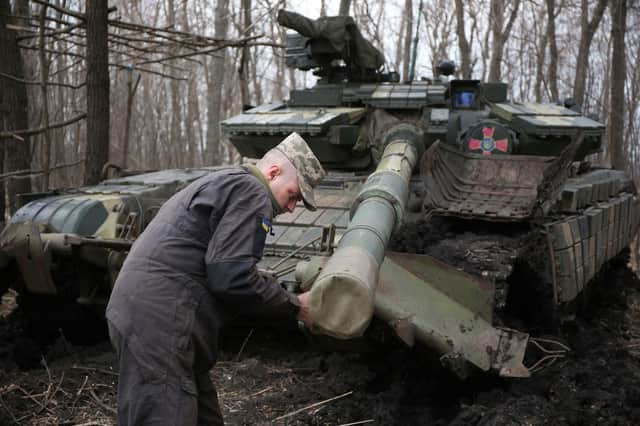As Russian troops mass on Ukraine's border and US plans Afghanistan withdrawal, United Nations' founding ideals are at risk – Joyce McMillan


Public buildings in Edinburgh were lit up in a fine shade of UN blue to mark the occasion; but the move has since become famous mainly for the decision of the UK government to go to law in an attempt to strike down the legislation, along with a similar act, proposed by independent MSP Andy Wightman which incorporates into Scots law the European Charter of Local Self-Government.
In a sense, the row over the Convention on the Rights of the Child is more a matter of symbolism than of substance. The incorporation of the charter into national law does give Scottish children the highest possible level of legal protection, when it comes to the rights enshrined there; but it is, nonetheless, almost 30 years since the United Kingdom itself ratified the Charter, an act which has had precious little impact on the shameful growth of child poverty in the UK, with all its attendant evils.
Advertisement
Hide AdAdvertisement
Hide AdBy adopting the UN Convention into Scottish law, though, the Scottish government seeks to send a signal that it represents a nation committed to the upholding of international law, and of the norms and values that support it; and eager to take its place, if and when independence is won, within international bodies such as the UN.
Boris Johnson’s UK government, on the other hand, currently wishes to send only one signal, both internationally and internally; and that is that Westminster holds absolute sovereignty, and will do as it pleases, whether that means trampling over the views of the devolved nations, deliberately breaking international law in dealings with our nearest neighbours, or treating all international charters and conventions with a measure of scorn.
Boris Johnson’s government has been well warned, of course, about the likely consequences of its “muscular brand of unionism”, and of its absolutist attitude to national sovereignty in the 21st century.
The Tories, though – along with right-wing parties across the world – currently feel that their brand of bully-boy politics is on a roll; and that the idea of a global system based on democracy and human rights is little more than a liberal pipe-dream.


It is all a far cry, in other words, from the UK and international scene of the late 1990s, when the newly elected Blair government was not only legislating to introduce devolution to Scotland, Wales and Northern Ireland, but also enthusiastically supporting what were known as “humanitarian interventions” designed, at least in theory, to make the values expressed in the UN Charter a reality for victims of oppression and conflict across the world.
That process juddered to a halt with the Iraq War of 2003, of course; conducted without full legal sanction from the UN, by what came to seem like two rogue western powers, that shocking conflict cruelly exposed the moral and legal weakness of the idea of a world system based largely on the military might of the United States, along with a few willing allies.
Despite some limited success in countries as disparate as Bosnia and Sierra Leone, the idea of using military force to end conflict and protect civilians was completely discredited within a few years of the 9/11attacks of 2001; and many of the hopes of 1990s, for a gradually maturing global system of legality and co-operation, went with it.
All of which brings us to the moment we face this weekend, with Russian troops massing on the eastern borders of Ukraine, and the United States planning a complete military withdrawal from Afghanistan, while a fragmented world community stands by, helpless to protect the innocent civilians, the young children, the women, the elderly, and other vulnerable groups, whose lives may be destroyed by these actions.
Advertisement
Hide AdAdvertisement
Hide AdThe Chinese and Russian governments are strengthening their own alliance, and increasingly speak with contempt of a United States whose only response to their aggression is the occasional round of sanctions against named individuals.
Anticipating their triumph after US withdrawal, the Taliban in Afghanistan talk bullying nonsense about how their Islamic faith is incompatible with democracy; and those who always mocked the idea of a rule-governed international order rejoice, apparently thrilled that their ugly cynicism has been proved justified.
Yet determined though many power-holders may be to betray the fundamental needs of their people in pursuit of personal and national glory, the fact remains that the vast majority of people do not want a world organised on these lines.
The ideas that led to the founding of the United Nations, and all its agencies, did not come from nowhere; they were a direct response to the lived reality of a decade of Nazism and global war, with all the catastrophic suffering it entailed.
These may, at the moment, be dark times for the advancement of those values, lightened only a little by the coming of the Biden presidency, which will surely be sorely tested by the Ukraine and Afghanistan crises in the coming months.
Yet the profoundly interconnected world in which we live will finally offer very little respite, for the global right, from the truth of humanity’s near-universal demand for the right to live their lives in peace, freedom, justice, and mutual respect.
The current Scottish government, for all its weaknesses, at least fully understands that. And as for the resurgent generation of bully boys and sovereigntists currently strutting the world stage, they will not be the first to imagine that they have crushed the demand for justice, peace and democracy; only to find their victims stubbornly singing songs of resistance on the streets, and declaring, with the late, great Maya Angelou, that “still, we rise”.
A message from the Editor:
Thank you for reading this article. We're more reliant on your support than ever as the shift in consumer habits brought about by coronavirus impacts our advertisers.
If you haven't already, please consider supporting our trusted, fact-checked journalism by taking out a digital subscription.
Comments
Want to join the conversation? Please or to comment on this article.